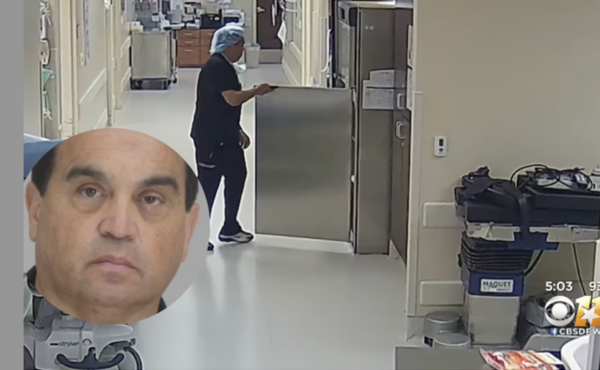Texas Doctor Allegedly Injected Heart-Stopping Drugs Into Patient’s IV Bags, Leading to One Death
A Dallas doctor has been arrested and stripped of his license for allegedly tampering with IV bags.
Authorities recovered footage of Dr. Raynaldo Rivera Ortiz Jr., a Baylor Scott & White Surgicare anesthesiologist depositing IV bags into a warmer in the hall outside operating rooms. The bags were found with small holes and plastic wrap. They were spiked with a local anesthetic, bupivacaine.
“Investigators found when he put a bag in the warmer, a patient would suffer serious complications shortly after,” a report from the Texas Medical Board says.
The board suspended Ortiz’s license during an emergency meeting on Sept. 9, and the federal investigation included the death of a fellow anesthesiologist, Dr. Melanie Kaspar. Investigators also looked into complications patients suffered because of the tainted IVs. All surgeries were halted that week because of the investigation.
Ortiz was charged with tampering with a consumer product and intentionally adulterating drugs. If convicted, he faces life in prison.
Bupivacaine is a local anesthetic used to numb an area of the body during or after surgery. The board said when given unknowingly “such drugs could and would be fatal.”
According to the board, Kaspar, 55, took an IV bag home on June 21. She was feeling ill and wanted to rehydrate. She had a “serious cardiac event” immediately after putting the IV in her vein and died, the report says. The medical examiner reported that her death was caused by accidental bupivacaine toxicity.
Investigators also ran tests on a saline bag that was given to an otherwise healthy 18-year-old patient who also suffered a cardiac emergency, which showed similar drugs were injected into the bag.
The patient identified in court documents as J.A., had a cardiac event during a scheduled surgery. He had to be intubated and transferred to a local intensive care unit, federal authorities said. The bag was infused with epinephrine, bupivacaine, and lidocaine, a local anesthetic that numbs and relieves pain.
Ortiz’s received his license in February 1991. Federal investigators looked into his actions from May to September in relation to 10 surgeries. The board ruled it was “an imminent peril to public health, safety, or welfare” to temporarily suspend his license in early September. He graduated from the University of Texas Medical Branch School of Medicine in 1989 and completed his residency in anesthesiology in 1993.
Court documents show Ortiz had a history of disciplinary actions against him and complained the facility was trying to “crucify” him. None of the cardiac events happened during surgeries Ortiz was involved in and none happened when he was on vacation.
In one instance, a nurse said Ortiz refused to use an IV bag she took from the warmer by “physically waving the bag off,” court documents show. Federal agents saw Ortiz on footage exit his operating room carrying an IV bag concealed in a paper folder, swap the bag with another bag from the warmer, and walk away.
About half an hour later, a 54-year-old woman suffered a cardiac emergency during a scheduled cosmetic surgery after a bag from the warmer was used during her procedure.
The U.S. attorney’s office has described Ortiz as a “medical terrorist.”
“Our complaint alleges this defendant surreptitiously injected heart-stopping drugs into patient IV bags, decimating the Hippocratic oath,” said U.S. Attorney Chad E. Meacham for the Northern District of Texas.
“A single incident of seemingly intentional patient harm would be disconcerting; multiple incidents are truly disturbing. At this point, however, we believe that the problem is limited to one individual, who is currently behind bars. We will work tirelessly to hold him accountable. In the meantime, it is safe to undergo anesthesia in Dallas.”

